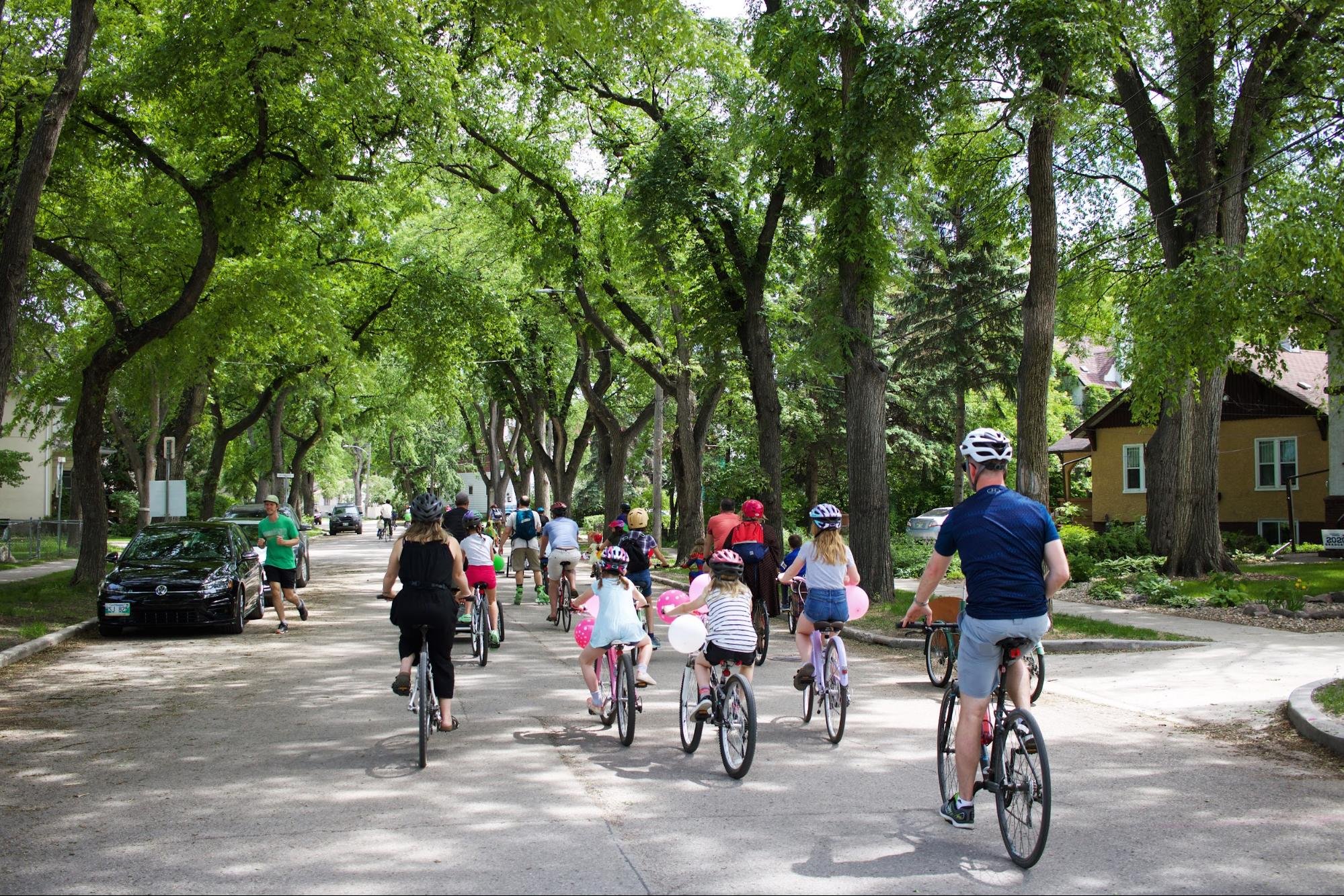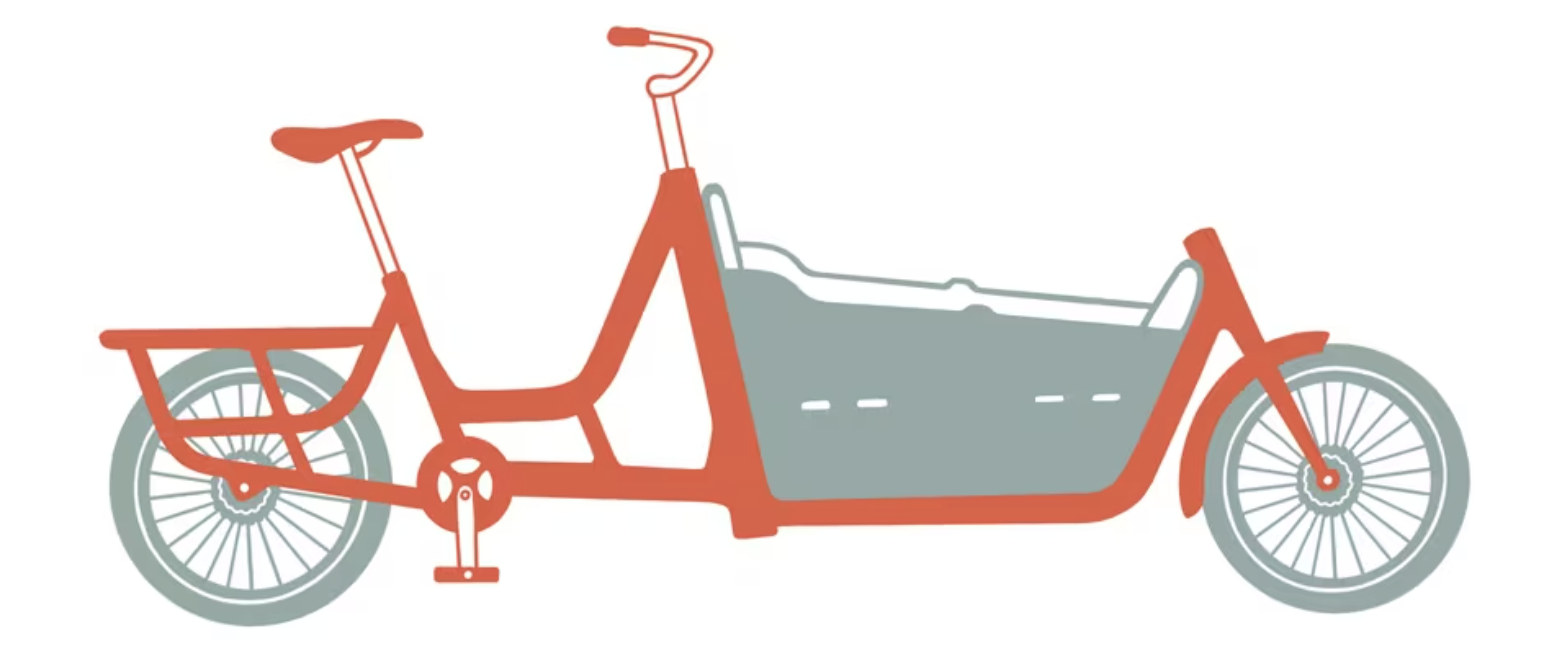Babes on Bikes: What to Know About Cycling With Your Little
A group of all ages enjoy a bike ride on a tree-lined street. Photo taken by Nicole Roach.
This year, Statistics Canada released data showing that only 47% of students who live less than 5 minutes from school walk or bike to school. While these numbers come as no surprise in car-centered Canada, it’s clear that cycling as a mode of active transportation is often an act that children may be more likely to engage in if their parent or guardian is a cyclist, too.One way to instill a lifelong passion for cycling and encourage more children to be cycling advocates, is by beginning to cycle with your child from a young age. In this article, we will explore some introductory material which outlines equipment that will be helpful in biking with your lil’ buddy. We will also touch on some of the barriers and inequities which prevent more parents and caregivers from biking with their babies.What you need to know
The recommended age provided by the American Association of Pediatrics (AAP) to start cycling with your baby is 12 months old. By that time, babies have developed enough strength in their neck required to support a helmet, and are also able to keep their head from bouncing when riding over bumps.In Canada, cyclists under the age of 18 must wear a helmet. Ensuring your little cyclist has a helmet that fits them well is crucial. Disclaimer: You may experience an overwhelming sense of peace and happiness, frustration and irritation, accomplishment and defeat, and laughter while biking with your child.A baby in a front bike seat. Image Source: Saltwire Magazine.
Getting started
There are many options for cycling equipment when cycling with your little one. Each one has its pros and cons!Cargo Bikes
A woman riding a cargo bike. Photo taken by Nicole Roach.
A child riding in a cargo bike with rear-mounted bike seat carrying toilet paper. Photo submitted by Cassie Smith.
Cargo bikes allow you to carry heavier loads than on a standard bike. The bikes are sturdy enough to haul multiple children at a time.Cargo bikes are the most expensive option for biking with children. Cheaper options can be as low as $1500, while more high tech, motorized, cargo bikes can go for up to $10,000.There are two types of Cargo bikes: longtail bikes and front-loading cargo bikes.Long-tail Cargo BikeFront-Loading Cargo BikeTrailers
A dog enjoying a ride on a bike trailer. Photo taken by Nicole Roach.
Ideal for kids (or furry friends!) about ages 1-6 (or up to about 40 pounds)Trailers can often carry more than one child, which is ideal if you have more than one little one! There is also a mesh screen which can be practical if biking in the rain, or to shelter children from sun or bugs. However, since trailers sit lower to the ground, children may be more exposed to car exhaust.Front and Rear Mounted Seat
A woman biking with two children on front- and rear-mounted bike seats. Photo taken by Holly Hixson.
Child enjoying a front-mounted bike seat. Photo submitted by Cassie Smith.
Child on the back of a Dutch Bike. Photo submitted by Tim Carey.
Ideal for kids about ages 1-4 (or up to about 50 pounds)
Riding with a child in a bike seat is a great opportunity to chat and experience the bike ride together since they are closer to you. However, compared to being in a bike trailer, the child is more exposed, and more high up. So if they were to fall, there is potentially a greater risk.Keep the pedals turning
Connecting with other caregivers who bike with their littles is a great way to build community! Cycle Nova Scotia (Previously Bicycle Nova Scotia) has in the past hosted workshops for New Mothers and Caregivers to become more comfortable cycling. Try connecting with local family resource centers in the area to see if there are any connections with cycling organizations, or try reaching out directly to cycling organizations to see if they have any support in place when beginning to bike with littles.Woman and baby on a front-loading bike seat. Photo taken by Ally Lord.
Ready to Roll
By becoming more aware and comfortable with different types of equipment, you may notice yourself becoming more eager, and less intimidated to try biking with your little! Integral to note: The freedom to bike with your child is deeply influenced by socio-economic factors such as race, class, and gender. Last year, People for Bikes released startling statistics sharing how Black cyclists are more than 4.5x as likely to die while riding a bike than white riders on a per-mile basis. Factors such as access to safe bike lanes, the ability to afford specialized equipment, and the privilege to already know how to bike, are all factors that will influence how safe and comfortable someone feels while biking with kids.There are organizations which exist to help mitigate the imbalances in children’s access to biking. My First Bicycle is a Canadian organization which provides bicycles to youth in economically challenged households across Canada. Children between the ages of 5 and 16 from Canadian low-income households are eligible to receive a cycling package (bicycle, helmet, lock, bell, and tools) donated by the My First Bicycle Foundation.Women in Urbanism Canada is eager to see photos of you and your little one on a bike.
Please reach out with any pictures you may have, or any questions you may be wondering about regarding biking with children: hello@womeninurbanism.ca Happy cycling!












